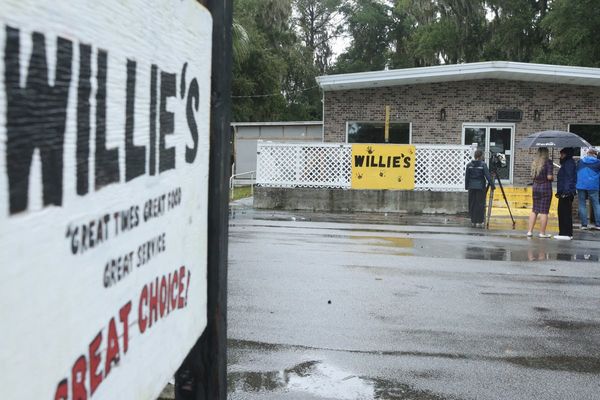
The door of Terence Davies’s 18th-century cottage is ajar when I arrive, the afternoon sun spilling into the hallway from the village green. Davies’ burly manager, John, shows me in, but the first glimpse I get of the man himself is in oils on the living room wall: a large portrait, painted by a neighbour, shows the bespectacled director of Distant Voices, Still Lives looking ivory-haired, pink-faced and pensive. It is likely that he popped out of the womb that way, and that his first words took the form of rhapsodies about Bruckner or the Shipping Forecast. He is 76 now but has given the impression of being old since the day he was born.
Rising from an armchair, Davies is wearing a light blue shirt, blue jeans, grey socks and slippers. On his face are the bristly beginnings of frost-white facial hair. “I’m not able to shave,” he explains, indicating his right arm hanging limply at his side. Four days earlier, he tripped and fell at home, dislocated his shoulder, and spent 13 hours in the local A&E department. “Having a fall reminds you of your mortality,” he sighs. “And your weight. I thought: ‘Blimey, I’m heavy!’” He has decided to count his blessings today. “Considering I’m the runt of 10, I’ve not been too bad where health is concerned. I shall just be like one of those wonderful women in 50s British cinema: I’ll be terribly brave, and I’ll call myself Muriel.”
Yesterday, he went for an MRI scan. “Have you ever had one? It suspends life and time. The young lad said: ‘It’s quite a unique experience.’ You’re lying in a white tube that makes these strange noises. The Prodigy would love to have written it!”
It takes a moment to absorb the incongruity of Terence Davies referring to the authors of Firestarter. In nearly half a century of films and interviews, he has done his utmost to distance himself from the modern world and all its vulgarity. This is one of the reasons I suggested visiting him in the waterfront Essex village where he has lived for the last 30 years, rather than accepting the publicist’s offer of a video interview; the prospect of a Zoom call with Davies feels unnatural somehow, like messaging Béla Tarr on Snapchat.

Aside from the trilogy of autobiographical shorts (Children, Madonna and Child, Death and Transfiguration) that announced him as a rigorous, poetic film-maker in the early 1980s, he has never directed anything with a contemporary setting. “Being in the past makes me feel safe because I understand that world,” he says.
His ninth feature, Benediction, drops anchor at two points in the life of the first world war poet Siegfried Sassoon. Jack Lowden plays him as a young man, drifting from one gay relationship to another after his fellow poet Wilfred Owen (Matthew Tennyson), whom he befriended when they were both convalescing at Craiglockhart war hospital, is sent back into battle, and to his death. Peter Capaldi takes over the role in Sassoon’s vinegary dotage, when he is unhappily married and has converted to Catholicism in search of something constant. “You can get that from dressage but without the guilt,” says his son.
Catholicism, homosexuality, poetry, torment: these are a few of Davies’ favourite things. But as the dressage line makes clear, the picture is also disarmingly funny in places, conveying the prickly vitality of Sassoon and the men in his orbit. Jeremy Irvine as a withering Ivor Novello and Simon Russell Beale as Robbie Ross (Oscar Wilde’s former ally) are among the notables trading barbs and throwing shade.
“Humour is so beguiling,” says Davies. “Especially when it masks tragedy.” He would know. Meet him and it hits you just how fully he has reconstructed his traumas on screen. When he talks about being bullied at school, or the cruelty of his “psychotic” father, the corresponding scenes from his films are already flickering in your head. The trilogy, made between 1973 and 1983, covers his wretched school days in Liverpool, his father’s death, his tortured sexual identity (“Still no interest in girls?” asks a GP) and his own imagined future decrepitude. The 1988 diptych Distant Voices, Still Lives is dominated by a volatile patriarch, played by the late Pete Postlethwaite, who beats his daughter with a broom until it breaks. When Postlethwaite questioned the scene’s veracity, Davies gave him his sister’s number and said: “Call her.”
His father died of cancer when Davies was seven; the body was kept in the front parlour for 10 days. “You could smell death. It was awful. I had to sleep in the bed he died in. I still get these very bad nightmares where someone is coming into the room to kill me.”

Between the ages of seven and 11, there was a respite during which Davies was “sick with happiness”. That fleeting paradise, which glows in the gloom of his past like a stained-glass window, is distilled in The Long Day Closes, his magisterial second feature. It evokes the calm between two storms: Dad is gone, the misery of school is only just beginning to dawn, and there is succour to be found in cinema, family, music and the texture of 1950s Liverpool.
With the exception of his 2007 documentary Of Time and the City, a lament for the lost landscape of his youth, Davies has abandoned direct autobiography ever since in favour of literary adaptations such as The House of Mirth and The Deep Blue Sea. But his twin studies of anguished poets – Benediction and its predecessor, A Quiet Passion, which stars Cynthia Nixon as Emily Dickinson – represent the closest he has come to self-portraiture. Whereas the early films processed the literal memories and sensations of his youth, these give the impression of a comprehensive stock-taking, a filtering of Davies’ life through the prism of other artists.

“When Emily says, ‘I have many faults, there is much to rectify’ – well, that’s me,” he says. “I still feel guilty about times I misbehaved. It really rakes my conscience. I once told my mother to shut up. How could I have said that?” I ask how old he was at the time. He blinks back at me. “Eight,” he says.
Then he softens. “I’ve not done anything horrible to anybody. But when you follow the rules, it can become destructive. You can end up not liking yourself. And I don’t think I do. I’ve said this a million times but I wish I were someone else. Someone very good-looking and very stupid. Then the world is your oyster.” Is he attracted to that sort of man? “Not at all. I just want to be them. You’ve only got to look at reality TV. After one series, you’re worth £2m. How do they manage that?” He tuts. “Big pecs, I expect.”
He has no hesitation in describing the new film as autobiographical. “Sassoon was looking for redemption. I was as well, until I realised that you can’t find it if it’s not in you.” He was a devout child. “Between 15 and 22, I fought my doubts because you were told that was the work of the devil.” His faith is far behind him now; at 22, he realised it was “all lies. Just men in frocks.” Even at this distance, though, he recognises its inhibiting hold on him. “I don’t like to make a fuss about anything. I always think I’ll get into trouble. I’m obedient and that’s what Catholicism is about. The dreadful thing is you can’t live up to its ideals, so you always fail.”

In Benediction, the older Sassoon complains that he has gone largely unappreciated, the prestigious awards doled out to others. Does Davies feel that about himself? “It would have been nice to be acknowledged by Bafta,” he concedes. “But they never have. Then again, there’s also part of me that thinks: isn’t it just vanity? If a film lives every time it’s seen, that’s the real reward.”
I wonder if Sassoon and Davies coincide in other ways. Was he ever tempted to marry a woman, as Sassoon did? “I did live with a woman when I went to film school. She was a teacher. Even as late as 1977, there was still this attitude of: ‘Well, find the right person and you’ll be happy.’ But it didn’t work out.”
Did he think life would be easier with a woman? “No, I’d never been with anyone. And I didn’t know how things can shift between people all the time. I found that very hard to bear. You misinterpret them, or they misinterpret you. I find that extremely difficult. I wasn’t very good at it. Neither of us were. We both knew what the truth was, and it sadly ended. Which is why I’ve lived alone since 1980.”
No boyfriends? “I did go on to the gay scene for a couple of months and I thought, it’s just not for me.” Why not? “I didn’t like the sexual venality and the narcissism. I can’t live like that. If that’s the way other people want to do it, that’s fine. And it’s something I’ve not regretted. I do know several gay couples who’ve been together a long time, and they love each other, and that’s lovely to see.”
He sounds resigned rather than sorrowful. “I’m not that good at life,” he says. “Because of that business of interaction between people and not being able to interpret things properly.” On the contrary, it may be that he interprets things too acutely. Earlier he had mentioned his father’s protracted, glowering silences, which made him feel “terrified all the time. The one thing I can’t bear now is atmospheres. I can come into a room full of people and I can tell you who’s had the row. I always say: if I’ve upset you, just come out with it. If you cold-shoulder me, I instantly see him sitting in the corner of the parlour and I’m a seven-year-old again.”
Loneliness doesn’t faze him. “I would prefer to be lonely and on my own than to live a life I couldn’t justify to myself,” he says. And he is hardly lacking in passion. He recounts cherished moments from Singin’ in the Rain, On the Town and Casablanca, and recites poems learned at his school desk nearly 70 years earlier. It is difficult to know where to look when he is in one of his reveries, so I gaze directly into his eyes. The spell is only broken when he rocks back in his seat and exclaims: “Oh! Isn’t it fab-ulous?” – one of his catchphrases.

Some of that positivity today is reserved for Benediction. “I’m very proud of it, I have to say. I think it’s the best thing I’ve done. Glorious from beginning to end.” John pops his head round the door to bring Davies outside at last for the photographer. “It’s the first time Terence has said anything nice about his own films,” he says cheerfully. “He’s usually so dismissive.”
The director starts putting on his shoes, then inserts his arms gingerly into a taupe jacket from Next. “Of course, there are still things I can’t get away from,” he says. “I thought, this time I’ve at least got to have some of the shots asymmetrical. All this ‘sticking them in the middle of the frame’ – it’s got to stop, I said to myself!” Lips pursed, eyes twinkling, he slips into the gossipy rhythms of someone nattering over the fence with a neighbour.
He may even have found a kind of peace. “I don’t know whether I’ve become more sensible,” he says. “I do see that this is my path. It’s a hard path to travel but I’ve got to be truthful to it. And I think I’ve achieved what I set out to do.” We are on the green now and the birds are singing. He gives my hand an appreciative squeeze, then toddles away for his moment in the sun.
• Benediction is released on 20 May







